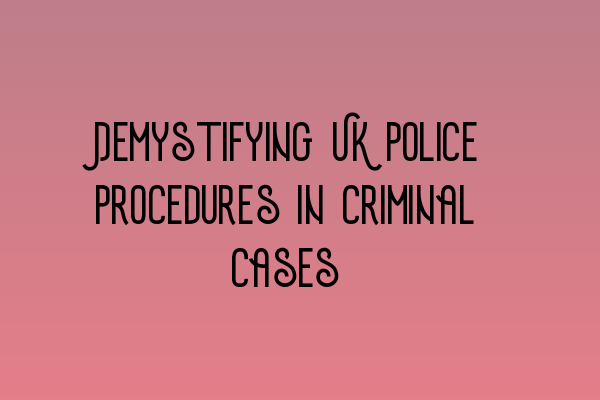Demystifying UK Police Procedures in Criminal Cases
When facing criminal charges in the UK, it’s crucial to understand the police procedures involved. Navigating the criminal justice system can be complex and overwhelming, but having a solid understanding of police protocols can help you build a strong defense strategy. In this article, we will demystify the UK police procedures in criminal cases, providing you with the knowledge you need to effectively navigate the system.
1. Arrest and Detention
The first step in any criminal case is arrest and detention. The police have the power to arrest individuals they suspect have committed a criminal offense. Upon arrest, you have the right to know the reasons for your arrest, the right to legal representation, and the right to remain silent. Understanding your rights during the arrest process is crucial to protect your interests.
Once arrested, you may be taken to a police station for detention. Detention allows the police to hold you for a specified period, usually 24 hours, before deciding whether to release you, bring charges, or seek further detention from the court. During this period, you have the right to consult with your solicitor, who can provide legal advice regarding your case.
2. Interviewing Suspects
After arrest and detention, the police will usually conduct an interview with the suspect. This interview is a crucial part of the investigation process, as it allows the police to gather evidence and obtain the suspect’s account of the events. It is essential to have legal representation during the interview to ensure that your rights are protected and to provide guidance on how to answer questions.
If you are invited for an interview as a suspect, it is important to seek the assistance of an experienced criminal defense solicitor. They can advise you on how to approach the interview and help you avoid self-incrimination. Remember, anything you say during the interview can be used against you in court.
3. Gathering Evidence
During the investigation, the police will gather evidence to build a case against the suspect. This can include witness statements, physical evidence, CCTV footage, forensic analysis, and any relevant documentation. It is crucial to ensure that the police follow proper procedures when collecting evidence to maintain its admissibility in court.
If you believe that the police have mishandled evidence or violated your rights during the investigation process, it is important to consult with your solicitor immediately. They can assess the situation, challenge any improper evidence, and protect your rights throughout the legal proceedings.
4. Charging and Bail
If the police find sufficient evidence to support a criminal charge, they will proceed with charging the suspect. The charge outlines the specific offense(s) the suspect is alleged to have committed. Once charged, the police may decide to release the individual on bail or apply for further detention.
Understanding the criteria for bail and the factors considered by the court is essential. Your solicitor can present arguments in support of your release on bail and help you understand the conditions attached to your release.
5. Further Investigation and Case Preparation
Following the initial stages of arrest and detention, the police may conduct further investigation to gather additional evidence. This can involve revisiting the crime scene, interviewing witnesses, or seeking expert opinions. Throughout this process, your solicitor can assess the evidence, challenge the police’s investigation methods if necessary, and prepare your defense accordingly.
It is essential to collaborate closely with your solicitor to provide them with all the necessary information and instructions. This will enable them to mount a strong defense, protect your rights, and challenge any evidence or procedural issues that arise during the course of the investigation.
Conclusion
Understanding the police procedures in UK criminal cases is crucial when navigating the criminal justice system. From arrest and detention to the gathering of evidence and the charging process, each step plays a significant role in determining the outcome of your case.
If you require legal assistance for your criminal case, our team at SQE Criminal Law & Practice Law UK is here to help. Contact us today for expert advice and representation.
Related Articles:
– SQE 1 Practice Exam Questions
– SQE 1 Practice Mocks FLK1 FLK2
– SQE 2 Preparation Courses
– SQE 1 Preparation Courses
– SRA SQE Exam Dates
